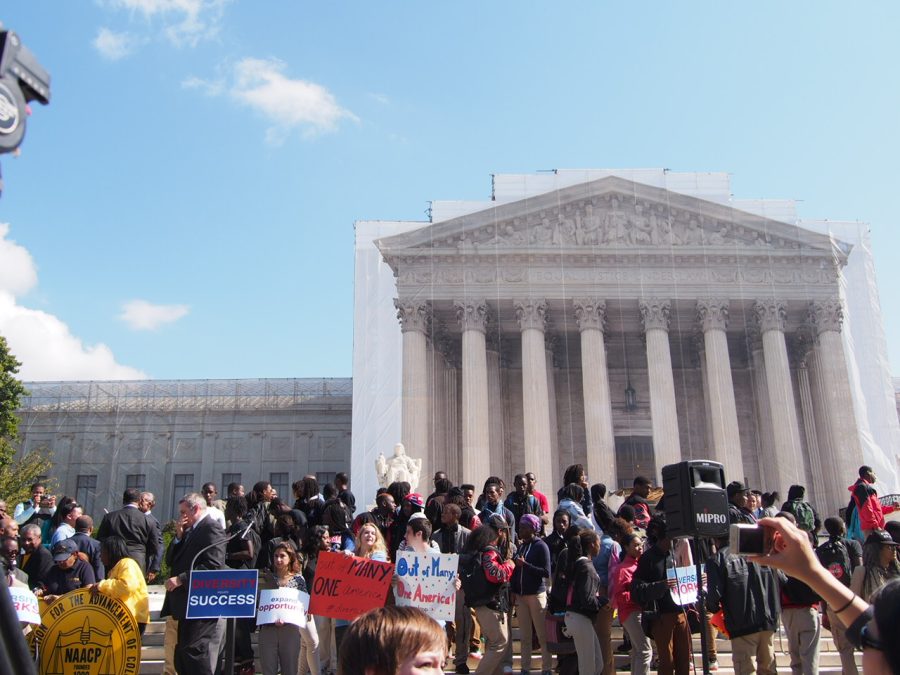Don’t look now, but a potentially landmark case is being argued in the Supreme Court.
Amid the partisan fervor of a presidential election, it is unsurprising that the case of Fischer v. University of Texas has failed to garner much coverage from major media outlets. But the story of Abigail Fischer, a white student who was denied admission to the University of Texas allegedly because of her race, has begun to pique the interest of the general public.
Abigail Fischer claims to have been wrongly discriminated against when she applied to and was rejected by the University of Texas in 2008. The university, like most across the country, uses a quota system requiring a certain percentage of representation of minorities in each incoming class.
Fisher, who is white, alleges that this practice led to her rejection despite the fact that she was more qualified than some minority students who were accepted. University officials deny Fischer’s academic eligibility.
If her claims are true, the case of Abigail Fischer is an illuminating example of the blind hypocrisy that is affirmative action. If the basis of the program is to foster a sense of equality and jettison discrimination, how can it be justified that a qualified student was rejected solely because of her race? If a black or Hispanic student was rejected by a school because of his or her race, there would be a national uproar.
If the 14th Amendment still holds true and all Americans are equal under the law, we should denounce discrimination in whatever form it takes.
Instead, universities and employers throughout the country, and in fact across the world, continue to treat specific ethnic, racial or other groups preferentially. These policies are enacted in order to ensure “diversity of experience” in the campus, workplace, etc., as if all members of individual racial groups have had similar experiences.
This notion is especially prevalent on college campuses, where cases like Fisher’s are commonplace, though frequently unreported. Professors and admissions officials who defend affirmative action believe that diversity is a goal to be ascertained through discriminatory policies. But the consequences of these practices not only lead to the rejection of students who are qualified for acceptance, but also negatively affect those students accepted because of their race.
Unqualified students who gain acceptance because of their race are thrust into a position where they are frequently bound to fail. In a study of the effects of affirmative action in 2004, UCLA professor Richard Sander found that about 50 percent of all black students at UCLA law school ranked near the bottom of their class, and that these students were far more likely to drop out or fail the bar exam.
Sander concluded that if race-based quotas were removed, there would be an increase in the amount of black lawyers, as they would attend less prestigious schools that more matched their skill level and develop over time instead of being set up to fail by an administrator’s view of fairness.
The original goals of affirmative action policies were to provide disadvantaged students with opportunities they might not otherwise have. This is a laudable goal that has unfortunately been perverted in practice to provide assistance to those who don’t really need it. Black or Hispanic students of academic merit are forced to question whether their achievements are really their own, or if they are beneficiaries of unearned assistance; minority students with less academic merit are set up to fail, and deserving white and Asian students are rejected from colleges because of their ethnicity.
If the purpose of affirmative action is to benefit the disadvantaged, there are prudent and fair policies that can be enacted. Preferential practices for low-income students are justifiable, since these students are obviously not afforded many of the academic luxuries of their wealthier peers and may have weaker transcripts, despite equal ability. But to suggest that race is a natural disadvantage is an outright fallacy, and the result of today’s policies benefit middle and upper class black and Hispanic students at the expense of white or Asian students of more modest backgrounds.
In 1963, Martin Luther King Jr. described a future in which his children would not be treated differently for their race. If we truly believe that it is not the color of our skin, but the content of our character that is important, then we should re-examine our affirmative action policies.

